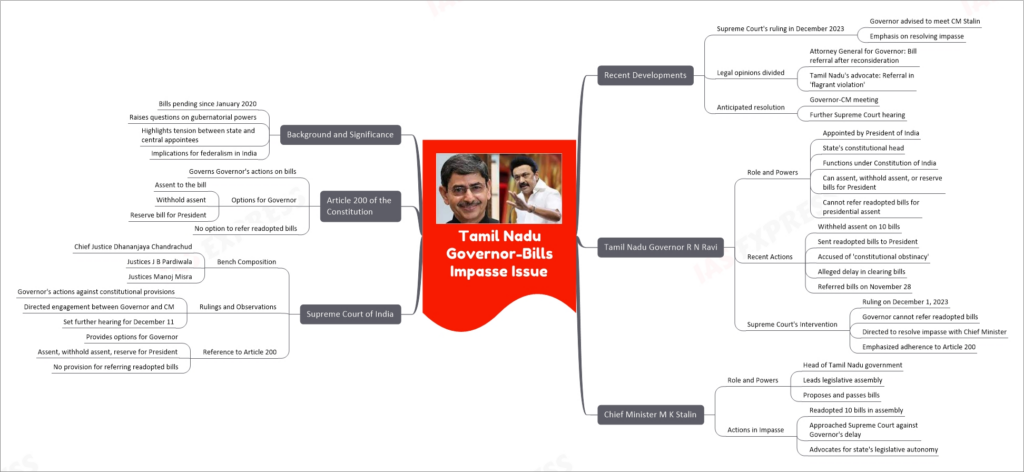Tamil Nadu Governor-Bills Impasse Issue
Introduction
In a recent development, the Supreme Court of India intervened in the ongoing impasse between Tamil Nadu Governor R N Ravi and Chief Minister M K Stalin. The apex court emphasized the importance of adhering to constitutional procedures in the matter of the Governor’s handling of bills passed by the state legislature.
Tamil Nadu Governor R N Ravi
- Role and Powers
- The Governor, appointed by the President of India, acts as the constitutional head of the state.
- He operates under the Constitution of India with the power to assent, withhold assent, or reserve bills for the President’s consideration.
- However, he cannot refer readopted bills to the President for assent.
- Recent Actions
- R N Ravi withheld his assent on 10 bills and later sent these readopted bills to the President.
- He faced accusations of ‘constitutional obstinacy’ and was alleged to have delayed the clearance of bills.
- The controversial referral of the bills occurred on November 28, 2023.
- Supreme Court’s Intervention
- On December 1, 2023, the Supreme Court ruled that the Governor cannot refer readopted bills for presidential assent.
- The court directed the Governor to resolve the impasse with Chief Minister Stalin, highlighting the need to adhere to Article 200 of the Constitution.
Chief Minister M K Stalin
- Role and Powers
- As the head of the Tamil Nadu government and leader of the legislative assembly, Stalin is responsible for proposing and passing bills.
- Actions in the Impasse
- The Chief Minister readopted the 10 bills in the assembly and approached the Supreme Court against the Governor’s delay, advocating for the state’s legislative autonomy.
Supreme Court of India
- Bench Composition
- The bench was led by Chief Justice Dhananjaya Chandrachud and included Justices J B Pardiwala and Manoj Misra.
- Rulings and Observations
- The court observed that the Governor’s actions were against constitutional provisions and directed him to engage with the Chief Minister.
- A further hearing on the issue has been set for December 11, 2023.
- Reference to Article 200
- Article 200 provides the Governor with three options: assent, withhold assent, or reserve a bill for the President, but it does not allow for referring readopted bills.
Article 200 of the Constitution
- Governance of Governor’s Actions on Bills
- Article 200 governs the actions a Governor can take on bills, limiting them to assenting, withholding assent, or reserving the bill for the President.
Background and Significance
- Context of the Impasse
- The bills in question have been pending since January 2020, raising critical questions about gubernatorial powers and the relationship between state governments and central appointees.
- The situation underscores the ongoing tensions within the framework of Indian federalism.
Recent Developments
- Supreme Court’s Ruling and Advisories
- In December 2023, the Supreme Court advised the Governor to meet with CM Stalin to resolve the impasse.
- The court placed a strong emphasis on adhering to constitutional procedures.
- Legal Opinions and Perspectives
- The Attorney General, representing the Governor, argued that the Governor can refer a bill to the President after the Assembly’s reconsideration.
- In contrast, Tamil Nadu’s advocate contended that such a referral is a ‘flagrant violation’ of constitutional norms.
- Anticipated Resolution
- A meeting between the Governor and the Chief Minister is expected, ahead of the further Supreme Court hearing.
Conclusion
The Supreme Court’s involvement in the Tamil Nadu Governor-Bills impasse marks a significant moment in Indian constitutional law. It underscores the delicate balance of power between state and central authorities and the critical role of the judiciary in upholding constitutional norms. The anticipated resolution of this impasse could set a precedent for future interactions between state governors and legislative bodies in India.
If you like this post, please share your feedback in the comments section below so that we will upload more posts like this.


